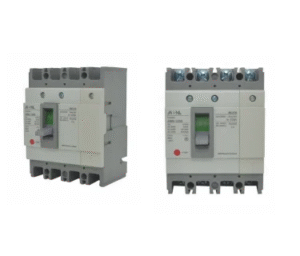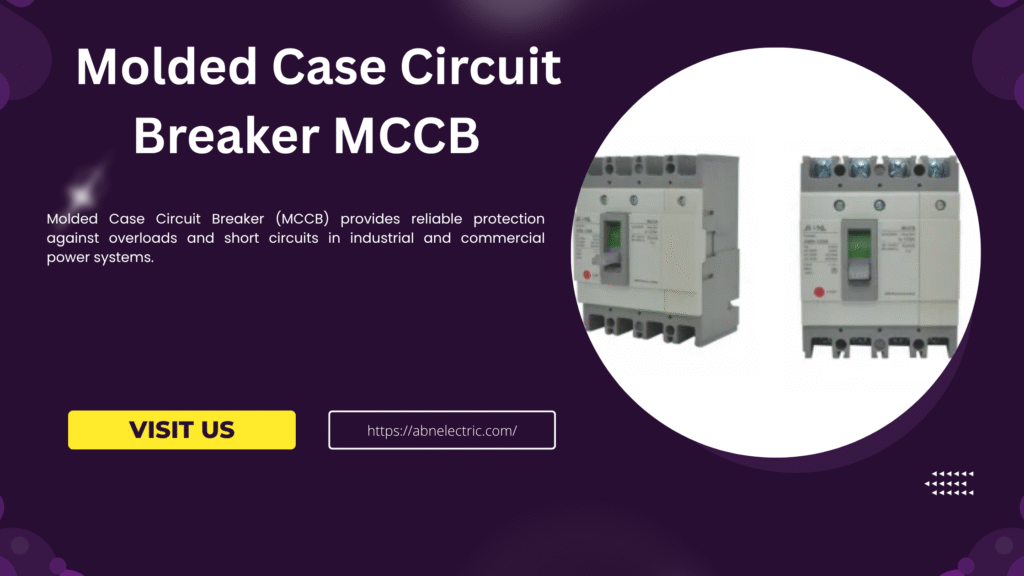When it comes to safeguarding electrical systems from potential hazards, molded case circuit breakers (MCCBs) are a critical component in many industrial and commercial environments. But what exactly is an MCCB? How does it work, and why is it so important for managing electrical systems?
This comprehensive guide will answer those questions and more. By the end of this blog, you’ll understand how an MCCB operates, its key features, and why it’s indispensable in modern electrical systems.
What Is a Molded Case Circuit Breaker MCCB

A molded case circuit breaker (MCCB) is a versatile, low-voltage electrical protection device. Its main job is to protect an electrical circuit from issues such as overloading, short circuits, and other faults. MCCBs are built with a durable, molded outer casing that houses the internal components. This design ensures enhanced durability and protection in various industrial applications.
What makes MCCBs stand out from other types of circuit breakers is their ability to handle high current ratings, often up to 1600A or even more, depending on the application. They also feature adjustable settings, giving professionals more control to suit unique operational needs.
Key Features of MCCBs:
- Wide Current Rating: MCCBs typically range up to 1600A and beyond.
- Adjustable Trip Settings: Advanced systems allow for thermal and magnetic trip settings to provide precise protection.
- High Breaking Capacity: MCCBs can handle significant amounts of current during a fault condition without damaging the system.
- Multiple Poles: Available as 3-pole or 4-pole systems to match application requirements.
- Versatile Use: Suitable for both AC and DC applications.
How Does a Molded Case Circuit Breaker Work
The primary function of an MCCB is to interrupt electrical flow during abnormal conditions, such as a short circuit or overload. Here’s a breakdown of how it operates:
-
Overload Protection
The MCCB uses a thermal trip mechanism to detect and react to prolonged overcurrent situations. Essentially, the heat generated by the overload warms a bimetallic strip, which bends and trips the breaker to stop the flow of electricity.
-
Short Circuit Protection
For short circuit conditions, MCCBs feature a magnetic trip system. This involves an electromagnet that senses the high fault current and instantly disconnects the circuit to prevent damage.
-
Manual and Automatic Operation
MCCBs can be turned on or off manually, but they also respond automatically to electrical faults. This dual functionality ensures both user convenience and system safety.
-
Resetting Capability
After tripping due to a fault, an MCCB can be reset manually to restore power. This reset feature makes it more user-friendly compared to one-time-use fuses.
Applications of Molded Case Circuit Breakers
MCCBs are widely used in industries due to their adaptability and robust functionality. Here are a few areas where MCCBs play a crucial role:
- Industrial and Commercial Facilities: Protecting heavy machinery and electrical networks from overload or faults.
- Power Correction Systems: Used with low-tension (LT) capacitors for maintaining power factor.
- Renewable Energy Systems: Manage the flow of electricity in solar and wind energy applications.
- Data Centers: Safeguarding servers and critical electrical components.
- Home and Building Automation: Ensuring reliable and safe electrical operations.
Advantages of Molded Case Circuit Breakers
Why are MCCBs a go-to solution for electrical engineers and businesses alike? Here are the key advantages that make them indispensable:
-
High Durability
With their molded casing, MCCBs are built to withstand tough industrial environments.
-
Customizability
The adjustable trip settings allow for precise protection tailored to specific circuit demands.
-
Wide Operating Range
MCCBs can handle a broad spectrum of currents, making them versatile enough for various applications.
-
Replacement-Friendly
Unlike some electrical components, MCCBs are easy to reset or replace as needed.
-
Compliance with Standards
MCCBs adhere to international standards like EN/IEC/IS 60947-2, ensuring they meet strict safety and performance criteria.
How to Choose the Right MCCB for Your Needs
Selecting the right molded case circuit breaker depends on a few critical factors:
- Current Rating: Consider the maximum load current your system requires.
- Breaking Capacity: Ensure the MCCB can handle potential fault currents.
- Number of Poles: Choose between 3-pole and 4-pole designs based on your system configuration.
- Adjustability: Look for MCCBs with customizable thermal and magnetic trip settings to suit your unique protection needs.
- Certifications: Make sure the MCCB complies with relevant international standards.
Pro tip: Investing in a high-quality MCCB ensures better durability, efficiency, and safety for your operations.
Common Questions About MCCBs
Are MCCBs compatible with both AC and DC systems?
Yes, MCCBs are designed for both alternating current (AC) and direct current (DC) applications, making them versatile for a wide range of systems.
What is the difference between MCCBs and standard circuit breakers?
While both devices serve the same basic function, MCCBs can handle significantly higher current ratings and offer adjustable trip settings, making them more suitable for industrial and commercial use.
Do MCCBs require regular maintenance?
Yes, periodic maintenance is essential to ensure optimal performance. This typically includes cleaning, testing, and checking for signs of wear or damage.
Future Trends in MCCB Technology
With advancements in technology, MCCBs are becoming even more sophisticated. Here are some trends to watch for:
- Smart MCCBs: Integration with IoT (Internet of Things) for real-time monitoring and remote control.
- Energy Efficiency: Enhanced designs to minimize energy loss during operation.
- Compact Designs: Smaller yet equally powerful MCCBs for modern installations.
Why MCCBs Are Essential for Modern Electrical Systems
Whether you’re safeguarding sensitive equipment or managing high-voltage systems, MCCBs deliver the reliability and functionality required for modern electrical systems. These devices are the backbone of safety in many industries, ensuring that operations run smoothly without risk of electrical damage.
If you’re searching for a molded case circuit breaker tailored to your needs, the experts at ABN Electric offer a comprehensive range of options for various industries. Explore their extensive product line and enhance the safety and efficiency of your electrical systems today.

